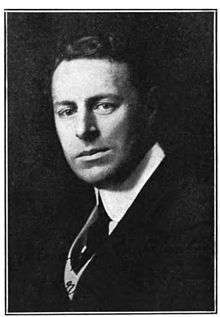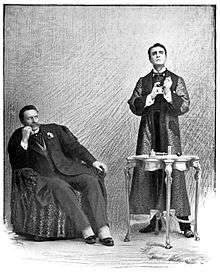Bruce McRae
Bruce McRae (January 15, 1867 – May 7, 1927) was an American stage and early silent film actor. He was the nephew of actor Sir Charles Wyndham.[1]
Bruce McRae | |
|---|---|
 McRae c. 1909 | |
| Born | January 15, 1867 |
| Died | May 7, 1927 (aged 60) |
| Occupation | Stage, film actor |
| Years active | 1908 – 1922 |
Description
Born in India in 1867 of Scots and English parents, McRae went to New Zealand at the age of sixteen where he worked in cattle ranching.[1] Later, adopting the profession of surveyor, he moved to Australia for five years.[1]
In 1890, he moved to the United States where he became manager of a cattle ranch in Laramie, Wyoming and a year later made his first appearance on stage supporting Elsie de Wolfe and Forbes Robertson in Thermidor at Proctor's 23rd Street Theatre. The two years following this he appeared in Aristocracy by Bronson Howard, who was married to his aunt, and then spent one season in Shenandoah by the same playwright.[1]
The season of 1895–1896, he played in The Fatal Card by C. Haddon Chambers and the following year supported Olga Nethersole, playing the leading juvenile roles in Camille, Denise by Alexander Dumas, Frou-Frou by Henri Meilhac, The Wife of Scarli by Giuseppe Giacosa and The Daughter of France, after which came two years as leading man with Herbert Kelcey and Effie Shannon in A Coat of Many Colors and Clyde Fitch's The Moth and the Flame.[1]

He was the first actor to play Dr. Watson to William Gillette's Sherlock Holmes, followed by two seasons as principal support to Julia Marlowe, playing Captain Trumbull in Barbara Frietchie and originating Charles Brandon in When Knighthood was in Flower.[1]
For several years, 1903-1908 he worked as leading man to the young Ethel Barrymore, appearing with her in Carrots,[2] A Country Mouse by Arthur Law,[3] Cousin Kate by Hubert Henry Davies, Sunday by Thomas Raceward,[4] A Doll's House, Alice Sit-by-the-Fire by J. M. Barrie,[5] Captain Jinks by Clyde Fitch,[6] The Silver Box by John Galsworthy and His Excellency the Governor by Robert Marshall. During this time he also participated in a number of special productions, such as the Miller-Anglin revival of Camille, the matinée of Paul Bertons's Yvette, The Embarrassment of Riches by Louis K. Anspacher at Wallack's and as leading man of the Bellows Stock Company at Elitch's Gardens, Denver, for the sumner of 1906.[1]
In the summer of 1907, he went to Chicago with Genesee of the Hills by Marah Ellis Ryan, supporting Edwin Arden. In the fall of that year, he left Ethel Barrymore and appeared first in The Step-sister by Charles Klein and then was engaged by Harrison Grey Fiske to support his wife, Minnie Maddern, in Ibsens's Rosmersholm.
In 1908, he toured the Pacific coast with The Thief by Henri Bernstein, playing the role originally played by Kyrle Bellew.
The season of 1908–09, he rejoined Barrymore's company, playing Paradine Fouldes in Lady Frederick by W. Somerset Maugham.
He also appeared with the likes of Douglas Fairbanks and William Garwood in 1908. After making his reputation acting in various Broadway plays, he moved into film in 1914 starring in about ten films until his retirement in 1922.
He died at his home on City Island, Bronx, in early May 1927.[7]
Filmography
- The Ring and the Man (1914) as George Gormly, alias of George Fordyce
- Via Wireless (1915) as Lieutenant Sommers
- The Chain Invisible (1916) as James Wadsworth, aka The Invisible Chain
- The Green Swamp (1916) as Dr. Ward Allison
- Hazel Kirke (1916) as Squire Rodney
- Beatrice Fairfax
- Episode 7: "A Name for the Baby" (1916)
- Episode 10: "Playball" (1916) as The Bookie
- A Star Over Night (1919)
- The World's a Stage (1922) as John Brand
References
- Johnson Briscoe (1909) The Actors' Birthday Book, Moffat, Yard and Company, New York
- Program from Carrots (1903) Library of Congress
- Program from A Country Mouse, Library of Congress
- Program from Sunday, Dartmouth College Library
- Program from Alice Sit-by-the-Fire, Library of Congress
- Captain Jinks, WorldCat
- Staff. "HEARING ON THEATRE ENDS.; Federal Trade Board Gets Data In Case of Western Movie Groups.", The New York Times, August 24, 1927. Accessed October 16, 2009. "Bruce McRae, actor, who died at his home at City Island on May 7, left an estate appraised yesterday at $237858 gross..."
External links
| Wikimedia Commons has media related to Bruce McRae. |